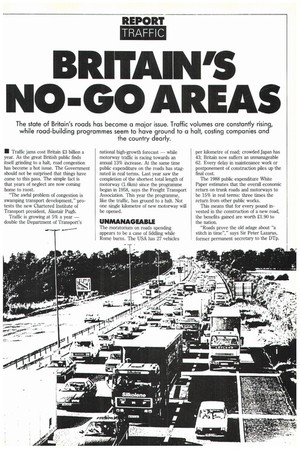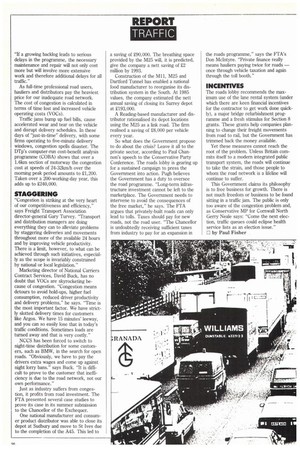BRITAIN'S NO GO AREAS
Page 49

Page 50

If you've noticed an error in this article please click here to report it so we can fix it.
The state of Britain's roads has become a major issue. Traffic volumes are constantly rising, while road-building programmes seem to have ground to a halt, costing companies and the country dearly.
• Traffic jams cost Britain £3 billion a year. As the great British public finds itself grinding to a halt, road congestion has become a hot issue. The Government should not be surprised that things have come to this pass. The simple fact is that years of neglect are now coming home to roost.
"The awful problem of congestion is swamping transport development," protests the new Chartered Institute of Transport president, Alastair Pugh.
Traffic is growing at 5% a year — double the Department of Transport's national high-growth forecast — while motorway traffic is racing towards an annual 13% increase. At the same time public expenditure on the roads has stagnated in real terms. Last year saw the completion of the shortest total length of motorway (1.61cm) since the programme began in 1958, says the Freight Transport Association. This year the programme, like the traffic, has ground to a halt. Not one single kilometre of new motorway will be opened.
UNMANAGEABLE
The moratorium on roads spending appears to be a case of fiddling while Rome burns. The USA has 27 vehicles per kilometre of road; crowded Japan has 43; Britain now suffers an unmanageable 62. Every delay in maintenance work or postponement of construction piles up the final cost.
The 1988 public expenditure White Paper estimates that the overall economic return on trunk roads and motorways to be 15% in real terms: three times the return from other public works.
This means that for every pound invested in the construction of a new road, the benefits gained are worth £1.90 to the nation.
"Roads prove the old adage about "a stitch in time"," says Sir Peter Lazarus, former permanent secretary to the DTp. "If a growing backlog leads to serious delays in the programme, the necessary maintenance and repair will not only cost more but will involve more extensive work and therefore additional delays for all traffic."
As full-time professional road users, hauliers and distributors pay the heaviest price for our inadequate road network. The cost of congestion is calculated in terms of time lost and increased vehicle operating costs (VOCs).
Traffic jams bump up fuel bills, cause accelerated wear and tear on the vehicle and disrupt delivery schedules. In these' days of "just-in-time" delivery, with some firms operating to five-minute delivery windows, congestion spells disaster. The DTp's computer-run cost-benefit analysis programme (COBA) shows that over a 1.6km section of motorway the congestion cost at speeds of 24-32km/h over the morning peak period amounts to 21,200. Taken over a 200-working-day year, this adds up to 2240,000.
STAGGERING
"Congestion is striking at the very heart of our competitiveness and efficiency," says Freight Transport Association director-general Gary Turvey. "Transport and distribution managers are doing everything they can to alleviate problems by staggering deliveries and movements throughout more of the available 24 hours and by improving vehicle productivity. There is a limit, however, to what can be achieved through such initiatives, especially as the scope is invariably constrained by national or local legislation."
Marketing director of National Carriers Contract Services, David Buck, has no doubt that VOCs are skyrocketing because of congestion. "Congestion means detours to avoid hold-ups, higher fuel consumption, reduced driver productivity and delivery problems," he says. "Time is the most important factor. We have strictly slotted delivery times for customers like Argos. We have 15 minutes' leeway, and you can so easily lose that in today's traffic conditions. Sometimes loads are turned away and that is very costly."
NCCS has been forced to switch to night-time distribution for some customers, such as BMW, in the search for open roads. "Obviously, we have to pay the drivers extra wages and come up against night lorry bans." says Buck. "It is difficult to prove to the customer that inefficiency is due to the road network, not our own performance."
Just as industry suffers from congestion, it profits from road investment. The vrA presented several case studies to prove its case in its summer submission to the Chancellor of the Exchequer.
One national manufacturer and consumer product distributor was able to close its depot at Sudbury and move to St Ives due to the completion of the A45. This led to a saving of £90,000. The breathing space provided by the M25 will, it is predicted, give the company a nett saving of 22 million by 1993.
Construction of the M11, M25 and Dartford Tunnel has enabled a national food manufacturer to reorganise its distribution system in the South. At 1985 values, the company estimated the nett annual saving of closing its Surrey depot at .2193,000.
A Reading-based manufacturer and distributor rationalised its depot locations using the M25 as a link road. The firm realised a saving of £8,000 per vehicle every year.
So what does the Government propose to do about the crisis? Leave it all to the private sector, according to Paul Channon's speech to the Conservative Party Conference. The roads lobby is gearing up for a sustained campaign to press the Government into action. Pugh believes the Government has a duty to oversee the road programme. "Long-term infrastructure investment cannot be left to the marketplace. The Government needs to intervene to avoid the consequences of the free market," he says. The FTA argues that privately-built roads can only lead to tolls. Taxes should pay for new roads, not the road user. "The Chancellor is undoubtedly receiving sufficient taxes from industry to pay for an expansion in the roads programme," says the FTA's Don McIntyre. "Private finance really means hauliers paying twice for roads — once through vehicle taxation and again through the toll booth."
INCENTIVES
The roads lobby recommends the maximum use of the lane rental system (under which there are keen financial incentives for the contractor to get work done quickly), a major bridge refurbishment programme and a fresh stimulus for Section 8 grants. These grants help companies planning to change their freight movements from road to rail, but the Government has trimmed back the money available.
Yet these measures cannot reach the root of the problem. Unless Britain commits itself to a modem integrated public transport system, the roads will continue to take the strain, and those people to whom the road network is a lifeline will continue to suffer.
This Government claims its philosophy is to free business for growth. There is not much freedom or business to be found sitting in a traffic jam. The public is only too aware of the congestion problem and, as Conservative MP for Cornwall North Gerry Neale says: "Come the next election, traffic queues could eclipse health service lists as an election issue." CI by Paul Fisher






























































